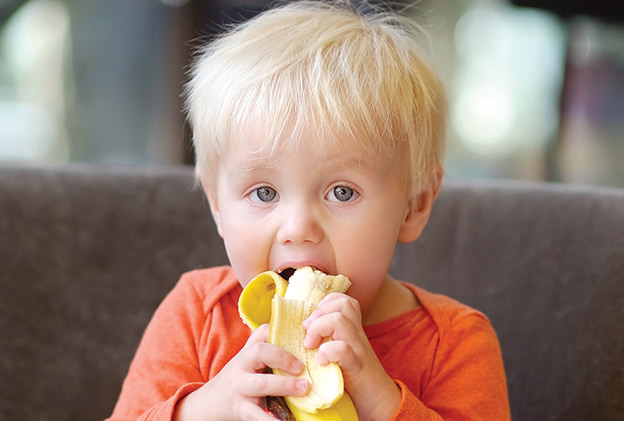
Section
Feeding Toddlers
Toddlers are gaining independence—and eating is part of that. Your child will want to feed himself. He will also want to choose what he eats, and how much. Give your child limited choices about eating. This can help prevent overeating and other eating problems later in life. Offer healthy foods for all meals and snacks. Over time, your child can learn to enjoy many new foods, and learn good eating habits.
Where to Find Help
Information and referral to services, including food assistance and disaster help.
2-1-1
Information from the American Academy of Pediatrics on children’s health, safety, and well-being.
Things You Can Do
Understand Picky Eating
It’s common for toddlers to refuse to eat, or to eat the same kind of food over and over. This can wor parents, but it’s often not serious. Toddlers usually get enough nutrition even when they are going through a picky phase. Here are some ways to handle picky eating.
Set a good example. Your children will copy what you eat and how you eat.
You may need to serve a new food many times before your toddler will eat it.
Offer a new food along with foods that he already likes.
Try to avoid battles over food, and try not to use food as a punishment or a reward.
Prevent Choking
Like babies, toddlers can easily choke. They still need to be supervised while eating.
Have your child sit down to eat. Use a high chair or booster seat.
Watch him while he eats. If he chokes, he cannot make noise to let you know.
Cut food into small pieces. Remove bones, seeds, and pits.
Avoid tough foods like large pieces of meat or dried fruit.
Avoid hard foods like raw carrots, nuts, and popcorn.
Take a first aid class so you know what to do if your child chokes. Contact your local Red Cross or American Heart Association.
What Foods Does Your Toddler Need?
Your toddler needs a balanced diet. Most days, a toddler should have:
6 servings of grains, such as bread, cereal, or pasta. A serving is ¼ to ½ slice of bread; 4 tablespoons of cereal, rice, or pasta; or 1 to 2 crackers.
2 to 3 servings of dairy food, such as milk. A serving is ½ cup of milk or a 1-inch cube of cheese. Between ages 1 and 2, your child needs whole milk to help his brain develop. After that, low-fat milk is healthier.
2 to 3 servings of fruit. A serving is ½ a piece of fruit, or ¼ cup. Whole fruit is healthier than juice.
2 to 3 servings of cooked vegetables. A serving is 1 tablespoon for each year of age.
2 to 4 servings of protein. A serving is ½ an egg or 2 tablespoons of meat, poultry, beans, or tofu.
Avoid foods high in sugar, salt, or fat, like chips and cookies. They can cause tooth decay and weight gain.
Iron Is Important
Your child needs iron to grow and to have energy to play, learn, and fight off illness. Serve foods that have a lot of iron, like:
Breads made from whole grains or with added vitamins and minerals
Cereals with added iron
Broccoli, spinach, and other leafy green vegetables
Peas, beans, and tofu
Meat, fish, and poultry

Toddlers should have 2 to 3 servings of fruit a day.
How Much Food Does Your Toddler Need?
Your toddler may seem less interested in food after his first birthday. This is because his growth has slowed down. Give your child at least 3 meals and 1 or 2 snacks a day. Serve small amounts. Then let him have more if he is still hungry. Children usually eat what they need, as long as they are given healthy foods.
Encourage your toddler to eat, but do not force him. Your child may eat a lot one day and less the next. This is normal. If you think your child is eating too much or too little, do not put him on a diet. Talk to your doctor or a counselor at WIC.